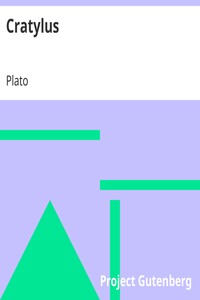| Summary |
"Cratylus" by Plato is a philosophical dialogue written in ancient Greece. This work deeply explores the nature and correctness of language, fundamentally questioning whether names derive their meanings from convention or are inherently tied to their subjects. It features three key characters: Socrates, who engages in discourse and analysis, Cratylus, who supports the idea that names are natural and true reflections of their objects, and Hermogenes, who argues for the conventionality of language. The opening of "Cratylus" introduces readers to the complexities surrounding language by portraying a debate on whether names hold intrinsic value or are subject to human invention. In initial discussions, Socrates prompts Hermogenes to clarify his views on name correctness, suggesting that names may indeed possess elements of truth. As Cratylus interjects, both characters present distinct theories—one advocating for the notion that names must be accurate representations of their meanings and the other arguing that names can be assigned arbitrarily. This sets the stage for a rich exploration of language's nature, integrating humor and satire to critique contemporary views, while also raising deeper philosophical inquiries into the connections between language, knowledge, and reality. (This is an automatically generated summary.)
|

